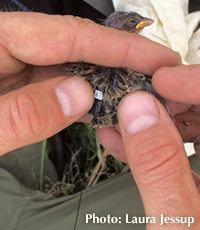Birds Long Term Monitoring With Ultra Low Power Wireless Sensor Node
From iis-projects
Contents
Short Description
Wireless sensors are most commonly used for monitoring, detection of events and in general collecting/processing/sending sensors data (i.e temperature, humidity, movements, etc.). Today this is a very mature technology and there are many applications exploits it. However there are many challenge to still be addressed and the lifetime is one of the most critical especially when the sensors node have a very small form factor as for example for wearable and implantable application. The main focus of this project is build a wireless sensors node equipped with an accelerometer and eventually with other sensors to monitor birds. The node has to have a small form fact and weight (less than 2 grams) to be placed on small birds included a battery. The node should also be able to have a lifetime that at least 1 days streaming the data out continuously. The processing of the data could be part of the project as well. The project is done in collaboration with Institute of Neuroinformatics
Depending on the applicant's profile and project type, his tasks may involve some of the following:
- lab. testing/characterization of the existing prototype: verification of the prototype's characteristics w.r. design specification (simulations), measuring power-consumption, and assessing detection performance in lab. conditions
- programming the circuit for specific application, field testing
- printed circuit-board design to make it suitable for bird monitoring.
Status: Available
- Looking for Semester and Master Project Students
- Supervisors: Michele Magno
Prerequisites
(not all need to be met by the single candidate)
- experience using the laboratory instrumentation - signal generators, oscilloscopes, DAQ cards, Matlab etc.
- analog electronics and signal conditioning with operational amplifiers: amplifiers, filters, integrators etc.
- knowledge of microcontroller programming (C, preferably CC2650 but it is not mandatory)
- basic knowledge on signal processing is a plus.
- plus is knowledge on printed circuit board (PCB) using Altium.
Character
- 30% Theory
- 50% Implementation
- 20% Testing
